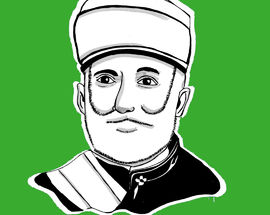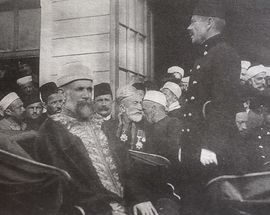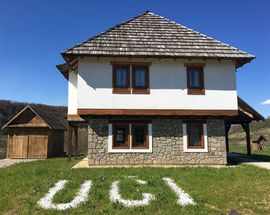Slavic Misery: Džemaludin Čaušević
more than a year agoČaušević was born on December 28, 1870 in the little village of Arapuša, near Bosanska Krupa. I’m guessing that nobody knows where that is, so referring to it as near there helps not one jot. Krupa is in northwestern Bosnia, not far from the border with Croatia on the Una River. During the Yugoslav years it had a mixed Serbian and Muslim population, although now there is a Muslim majority. It’s actually a pretty nice town, but we aren’t here to talk towns, we’re here to talk Čaušević.
Džemaludin (a really fun word to say, pronounced jem-ah-lewd-in, but for the rest of this entry I’m going to refer to him as Jimmy) had been homeschooled by his father in his formative years. Arapuša is just 19 miles or so from the equally wonderfully named Bihać, and it was there that Jimmy continued his studies at the local madrasa. Jimmy was a pretty good student, and subsequently attracted the attention of the mufti (Islamic scholar), who took him under his wing so to speak. He wasn’t under the wing for too long however, and by the age of 17 Jimmy swanned off to Istanbul to study Islamic Studies.
Jimmy enrolled at law school, the Mekteb-i-Hukuk. I don’t really know what that means. This represented his first exposure to Ottoman modernisation, and the boy was soon hooked. Some people get hooked on drugs and alcohol during university, but our dear Jim’s addiction was the improvement of his people’s lot. During his summers he would travel back to Bosnia to give talks on what he had learnt, and people were fairly responsive. Jim was all about social and religious reform, something that soon caught the attention of his elders.
These cogent experiences would continue as he spent time in Cairo, attending the lectures of Muhammad Abduh, one of the key figures in Islamic Modernism. Jimmy meeting Abduh gave him a new sense of purpose. Jimmy graduated from Mekteb-i-Hukuk in 1901, and surprised many by choosing to return to his native Bosnia. Most Muslim intellectuals from Bosnia were taking any and all opportunities to get out you see.
Predictably, Čaušević lived in Sarajevo, the centre of a nation going through a maelstrom of social and political change. The Muslims of Bosnia weren’t having the best of times under the Austro-Hungarian Empire, and well-read Muslim activists hell-bent on reform, such as our mate Jimmy, were desperately needed. Well versed in Islamic theology, Jim also had a keen understanding of modern science and thought. He knew the challenges facing the Muslims of Europe, and he felt very strongly that the way forward depended on an improved education and modern thinking.
‘Muslims fell into a deep sleep, from which they were not able to wake up until the Europeans, with their weapons of knowledge and all sorts of inventions, came to the door of their house and demonstrated the divine truth. Knowledge and ignorance cannot be equal, knowledge always triumphs over ignorance’.
It is important to remember that Muslims invented algebra, the toothbrush and hospitals, but at the beginning of the 20th century they were in something of a deep stupor in Europe. Jimmy felt that the way forward was to follow the European model, to embrace the printing press and for Muslim women to uncover their faces. The unveiling and general emancipation of women was one of his major fights. Jimmy exchanged many angry letters with fellow Muslim intellectuals on the subject, because that is how intelligent people fight.
Jimmy also worked tirelessly towards the education of everyday people. He relentlessly promoted literacy, and even introduced a simpler type of Arabic script for the Bosnian language. He commissioned a chum of his, Agof effendi-Zeronian (a freakin’ glorious name), to print Arabic letters for missing Bosnian characters, such as Ž, Č and LJ. Jimmy’s script was known as Arebica. It almost became the third official alphabet of Bosnia, which would have made things a hell of a lot more complicated for me today.
His position as the leading light in the European Islamic world was put into writing in 1914, one year after Hafiz Sulejman Sarač resigned as reis-ul-ulema. Jimmy took control on the eve of World War One, a difficult time to take control to say the least. I wouldn’t fancy taking the position as the leading Muslim in Bosnia now, let alone on the eve of the first bloody world war.
During his time as reis-ul-ulema, Jim continued his indefatigable work towards the advancement of his people. His position came to a fairly abrupt end on January 31, 1930 however, when he resigned from his post. The reason for his resignation was the passing of a law that basically eliminated the autonomy of the Bosnian Islamic hierarchy, meaning he would have to move to Belgrade and leave subordinates behind in Sarajevo or Skopje. Jim wasn’t about to do this, so he did the honourable thing and quit. His successor was Ibrahim Maglajlić, a Serb sympathiser who would more willingly tow the Yugoslav line.
Jimmy remained active in Islamic intellectual discourse after his resignation, contributing to literary papers, discussions and much more, he would go on to publish the first Bosnian translation of the Koran in 1937, which was printed alongside the original and with added commentary. A year later he would die, immediately remembered and beloved as a true symbol of hope for enlightenment among Bosnian Muslims. In a time where the main hobby of western media is to paint Muslims in a bad light, a little bit of realism is required on behalf of the reader. Regardless of religion, Jimmy Čaušević was a beacon of progression in a time when progressive men only seemed to exist in literature, and for that he deserves our applause.
(applaud)







Comments